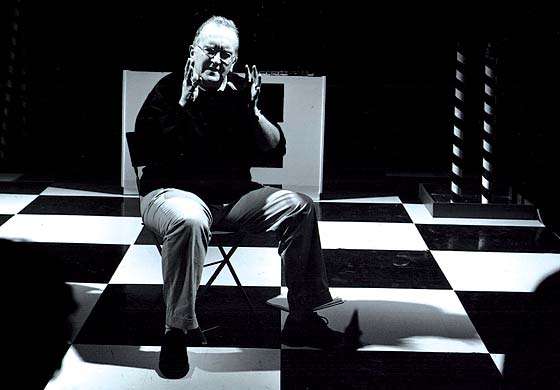
Two years ago, the British director John Doyle received an invitation to stage a show at Cincinnati Playhouse in the Park. “I thought, This is nice,” he recalls. “I’m being asked to come to America—to a city I’ve heard of—and that’s lovely. I thought I’d be quietly going there and doing my thing. Then Sweeney opened, and things took off a bit.”
Doyle’s revival of Stephen Sondheim’s Sweeney Todd came to Broadway last fall and blew the city’s mind. Working from a dicey premise—a cast of ten actor-musicians replaced the usual 27-person cast and orchestra—he won critical adulation and booming box office (by Sondheim standards, anyway). Suddenly that Cincinnati gig, applying a similar device to Sondheim and George Furth’s Company, didn’t seem so quiet, especially after a rave in the Times and an invitation to Broadway.
The understated Doyle does not wear the mantle of a revolutionary easily. “I freak out when people talk about this as an art form,” he says of his approach. It grew from simple financial necessity: In British regional theater, Doyle had to do more with fewer people. “I’ve staged a couple of hundred shows,” he says. “They certainly did not all include people carrying trombones around.”
But for his Company—as for Candide and some twenty other shows—the toted-trombone trick worked best. The story centers on perennial bachelor Bobby (Raúl Esparza) and the mating rituals of upscale New Yorkers. Around him, the cast remains onstage all evening, playing in a way that Doyle says is “more character-led” than in Sweeney. “Husbands and wives play to each other, sometimes in harmony, sometimes in disharmony. It’s like a marching band gone mad.” But Doyle cautions against getting hung up on the device. “The music playing is a means to an end—the end being engagement between the audience and performers,” he says. That’s also why he’s moved the action from 1970 to the present. “I’m not going to let [the audience] off the hook by saying this is about people who lived 35 years ago. It’s saying, ‘I’m Bobby, you’re Bobby, the woman sitting next to you is probably Bobby.’ ”
As theater costs rise and corners get cut, the case for such approaches only strengthens. For his part, Doyle looks forward to Ibsen, Shakespeare, Chekhov—no instruments but the same theatricality, since ultimately “the only resource is the imagination of the audience. My job is to tap that imagination. I like to think that’s my trademark.”
—Company, By Stephen Sondheim and George Furth; Barrymore Theatre; opens November 29. Next: Q&A With High Fidelity Actor David Lindsay-Abaire